|
De Nederlandse schrijfster en columniste Margaretha Hendrika (Cri) Stellweg (alias Saartje Burgerhart) werd geboren in Nijmegen op 23 maart 1922. Zie ook alle tags voor Cri Stellweg op dit blog en ook mijn blog van 27 november 2006.
Uit: Geef mij maar een klaproosje…
“Ik gaf me er juist reken-schap van, dat geen provencaalse cigale mijn schoorsteenmantel zou sieren deze winter, toen m'n hoofd onzacht in aanraking kwam met de voorruit. „Zeg, ben je nou helemaal ...," begon ik, mijn gekwetste hoofd betastend. „Stil," fluisterde mijn man dringend, „kijk es! Kijk toch es!!" „Waar?" vroeg ik, nog scheel van de klap. „Daar." Ik keek en ja, ik zag het .... Allemaal beesten op de weg. Hopen beesten! Hele horden! Hebberig scharrelde hij de auto al uit. lk volgde, een opkomende buil betastend. Toen ik op de weg stond, kon ik de zaak pas goed overzien: het krioelde er van vreemde, grote insecten, een soort sprinkhanen en toch géén sprinkhanen. Wel 7 tot 10 cm lang en in verschillende tinten gekleurd. Met acht reusachtige gebogen poten, lange voelsprieten en puntige venijnige koppen. Ze zaten in de planten aan weerszijden van de weg, ze kropen over het asfalt en enkele ondernemenden begonnen de auto al te beklimmen. „Aaaach," zei ik verbijsterd, „wat een boel! En wat zijn 't?! Wil je er een vangen? Ik vind het wel erge griezels, vies ook ... !"
„'k Weet niet wat het zijn,” zei hij, „geef me gauw een doosje." Voorzichtig over de beesten heenstappend, liep ik naar de auto terug. Toen ik er achter om heen kwam, zag ik iets, waarvan de haren me overeins gingen staan. Wij hadden met onze wielen verscheidene exemplaren ver-morzeld of geraakt, de overlevenden kropen nu belust op deze lijken en invaliden rond, knaagden eraan en vraten ze op ... ! Het malen en knar-sen van hun kaken was duidelijk hoorbaar in de zware, hete stilte van de verlaten weg. Met wijd opengesperde ogen en de rillingen over m'n kruin stond ik er doodstil naar te kijken, tot ik iets scherps op m'n voeten voelde. lk keek: er kroop er een over mijn blote tenen in de open schoen .... Ik gaf een gil en rende naar de auto. „Erin!" dacht ik, „weg van dit gespuis!" „Wat is er?" riep de jager uit het kreupelhout waar zich blijkbaar de mooiste exemplaren op-hielden. „En waar blijft die doos?" „Kom jij je doos zelf maar halen," riep ik opgewonden, „ik zet . geen stap meer hier. Die beesten vreten elkaar op en ze willen aan mijn tenen beginnen." „Doe niet zo over-spannen!", riep hij boos, „kom op met dat doosje!" „Geen sprake van. Ik ben voor m'n plezier uit. Straks klimmen ze nog in m'n boothals," gaf ik, even boos, terug. Getergd kwam hij aangestapt, dwars door en over de regimenten rondscharrelende beesten.”
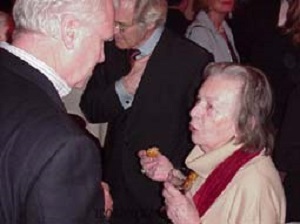
Cri Stellweg (23 maart 1922 - 26 november 2006)
Hier met Adriaan van Dis in 2003
De Japanse dichteres en schrijfster Yōko Tawada werd geboren op 23 maart 1960 in Tokyo. Zie alle tags voor Yōko Tawada op dit blog.
Uit: Celan Reads Japanese (Vertaald door Susan Bernofsky)
“The world beneath the water is behind the threshold. The ‘I’ in the poem sees how the ‘poplar’ dips down into the unfamiliar world of the water, but the ‘I’ remains an observer and doesn’t hurry after it.
Ich eilt ihr nicht nach,
ich las nur vom Boden auf jene Krume,
die deines Auges Gestalt hat und Adel,
ich nahm dir die Kette der Sprüche vom Hals
und säumte mit ihr den Tisch, wo die Krume nun lag.
I didn’t hurry after it,
I merely gathered from the ground the crumb
that has the shape of your eye and nobility
I took the chain made of proverbs from your neck
and draped it about the table where the crumb now lay.
The ‘I’ doesn’t descend into the water but rather remains on the threshold pursuing a magical game: The stone and the circle are copied with the help of the ‘crumb’ and the ‘chain’ and so the image said to be visible beneath the water is repeated upon the table.
This magical game has the effect of a process of translation. The translator copies the image that exists beneath the water on the desk. The poplar, on the other hand, is not a translator. Its body disappears in the water.
If one were to equate the unfamiliar world beneath the water with the realm of the dead, then the magical game would be a translation of the language of the dead into writing. The translator hears the word of the dead and reads it [does he gather it up – auflesen – like ears of grain from the ground or read it – lesen – like a written character?] and places it upon the desk, i.e. he writes. The poplar on the other hand does not write. It vanishes beneath the water like a dying woman: Und sah meine Pappel nicht mehr [‘And did not see my poplar again’].”
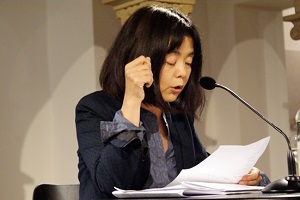
Yōko Tawada (Tokyo, 23 maart 1960)
De Amerikaanse dichter Gary Joseph Whitehead werd geboren op 23 maart 1965 in Pawtucket, Rhode Island. Zie alle tags voor Gary Whitehead op dit blog.
Uncle
Sometimes they talk with me,
these children I have not fathered,
and the things they say,
though I forget them,
seem like sentences out of books
I read once and haven’t thought of since.
Today, a boy who in the absence
of his density might have been me,
the fiddlehead of his hand
in mine, followed me
through the upstairs hall,
asking something which,
if I had to guess,
I’d say had to do with destiny.
Outside, a school bus was passing,
the rev of its engine
like a bow drawn across a string,
a brief life’s arc of sound
into and out of the house –
windows and walls and quiet rooms –
where I stood dumbstruck
and almost ready to answer.

Gary Whitehead (Pawtucket, 23 maart 1965)
Pawtucket, Rhode Island
De Amerikaanse schrijver Mitch Cullin werd geboren op 23 maart 1968 in Santa Fe, New Mexico. Zie alle tags voor Mitch Cullin op dit blog.
Uit:Whompyjawed
“Harvey lifts the three fingers so Doc can get a look at them. "Feels fine, Doc," he says.
Doc brings those fingers close to his face, squints his eyes to inspect, sort of bends Harvey's fingers one way and then another.
"Hell," Harvey says, "seventy-two was laying down for me during the second quarter just so he wouldn't have to tackle Willy no more."
"Harvey," Doc says, "you're a case for the books. Peel it and shower. Let me have a see before you leave."
And Harvey nods with that mouthful of chew. Doc pats him on the stomach and moves on. He moves past several of us, sometimes swatting butts, though there ain't nothing weird about how he does it, or touching heads. Then he comes to where me and Lee Haywood, the quarterback, and my black friend Sammy are standing together as we remove our gear. "Good game," he tells us, "all of you. Everybody here okay?"
We nod our heads that we're fine, so Doc repeats himself by saying, "Hell of a good game, boys. I'm proud of you."
"We could've hung thirty more on them, Doc, if Coach hadn't wanted to ease up," says Lee. Then Lee glances at me and Sammy. "Gutting them with Willy," he says, "they was trying to man Sammy. Even I could of hit him all night."
Sammy laughs, flashes a big smile, so me and Doc start to laugh a little too. "All Lee's got to do, Doc," says Sammy, "is get' em up in the air. I'll be there when they come down."
"I tell you, Doc," says Lee, "it do make quarterbacking fun."
But before I can join in, I hear Coach Slick, our assistant football coach, call my name. So I lean forward some and see him standing outside Coach Bud's office, his thumb jerking toward the open door behind him, saying, "Hey, Willy, Coach wants to see you."
The thing about Coach Bud is that when he wants to see someone, no matter what that person is doing, he had best drop everything and go. Don't matter if he might be getting wrapped by Doc. Don't matter if he's taking a shit or is butt-naked in the shower. He ain't kept waiting by no one, especially us. That's just how it is.”

Mitch Cullin (Santa Fe, 23 maart 1968)
De Amerikaanse schrijver Steven Saylor werd geboren op 23 maart 1956 in Port Lavaca Texas. Zie alle tags voor Steven Saylor op dit blog.
Uit: Empire
“A.D. 14
Lucius woke with a start.
He had been dreaming. In his dream there was no earth, only a dark, empty sky, and beyond the sky, unimaginably vast, the crystalline firmament in which the stars shone brightly. No clouds obscured the stars, and yet there was lightning in the dream, lightning without thunder, random flashes of blinding light that illuminated great flocks of birds that suddenly filled the dark sky. There were vultures and eagles, ravens and crows, every sort of bird imaginable, soaring and flapping their wings, yet making no more sound than the silent lightning. The dream had filled him with a sense of urgency and confusion.
Awake now, Lucius heard a faint rumble of thunder in the distance.
He heard other sounds from elsewhere in the house. The slaves were up and beginning to stir, stoking the kitchen fire and opening shutters.
Lucius jumped from his bed. His room, with a small balcony looking west, was on the upper floor of the house. Below him was the slope of the Aventine Hill. The nearer houses, along the crest of the hill, were large and well made, like his family's house. Farther down the hill, humbler houses and tenements and artisans' workshops were crowded close together, and farther yet was a flat expanse with large granaries and ware houses close to the Tiber. At the river the city ended. On the far side of the Tiber, woods and meadows were divided into the private estates of the rich, which extended to the far horizon of hills and mountains.
How his mother hated this view! Born into a wealthy branch of the Cornelius family, she had grown up in a house on the other, more fashionable side of the Aventine Hill, with a view of the vast Circus Maximus below, the Capitoline Hill crowned by temples off to one side, and, directly opposite, the opulent Palatine Hill, where the emperor lived.”
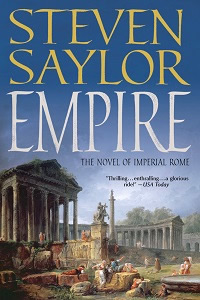
Steven Saylor (Port Lavaca, 23 maart 1956)
Cover
De Franse schrijver Roger Martin du Gard werd geboren op 23 maart 1881 in Neuilly. Zie alle tags voor Roger Martin du Gard op dit blog.
Uit:Les Thibault, I, Le pénitencier
«Antoine entra tout droit dans le cabinet de son père, qui mettait en ordre son bureau avant d’aller au lit.
— « Ah, c’est toi ! Mauvaises nouvelles ! »
— « Oui », interrompit Antoine, « M. Chasle m’a raconté. »
M. Thibault tira d’un coup sec le menton hors de son col ; il n’aimait pas qu’on sut ce qu’il s’apprêtait à dire. Antoine, pour l’instant, ne s’en souciait point ; il songeait à ce qu’il venait faire, et sentait déjà la paralysie le gagner. Il en eut conscience à temps, et fonça :
— « Moi aussi, je t’apporte de très mauvaises nouvelles : Jacques ne peut pas rester à Crouy. » Il reprit haleine, et continua d’un trait : « J’en arrive. Je l’ai vu. Je l’ai confessé. J’ai découvert des choses lamentables. Je viens en causer avec toi. Il est urgent de le sortir au plus tôt de là. »
M. Thibault demeura quelques secondes immobile. Sa stupeur ne fut perceptible que dans sa voix :
— « Tu… ? À Crouy ? Toi ? Quand ? Pourquoi faire ? Sans me prévenir ? Es-tu fou ? Explique-toi. »
Quoique soulagé d’avoir du premier bond franchi [ I-205 ] l’obstacle, Antoine était fort mal à l’aise et bien incapable de parler. Il y eut un silence étouffant. M. Thibault avait ouvert les yeux ; ils se refermèrent lentement, comme malgré lui. Alors il s’assit et posa ses poings sur le bureau.
— « Explique-toi, mon cher », reprit-il. Il martelait avec solennité chaque syllabe : « Tu dis que tu as été à Crouy ? Quand ? »
— « Aujourd’hui. »
— « Comment ? Avec qui ? »
— « Seul. »
— « Est-ce que… on t’a reçu ? »
— « Naturellement. »
— « Est-ce que… on t’a laissé voir ton frère ? »
— « J’ai passé toute la journée auprès de lui. Seul avec lui. »
Antoine avait une façon provoquante de faire sonner la fin de ses phrases, qui fouetta la colère de M. Thibault, mais l’avertit qu’il y avait lieu d’être circonspect. »
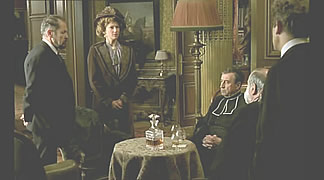
Roger Martin du Gard (23 maart 1881 – 22 augustus 1958)
Scene uit de Franse mini-serie « Les Thibault » uit 2003
De Amerikaanse dichter Madison Julius Cawein werd geboren in Louisville, Kentucky, op 23 maart 1865. Zie ook alle tags voor Madison Cawein op dit blog.
A Yellow Rose
The old gate clicks, and down the walk,
Between clove-pink and hollyhock,
Still young of face though gray of lock,
Among her garden's flowers she goes
At evening's close,
Deep in her hair a yellow rose.
The old house shows one gable-peak
Above its trees; and sage and leek
Blend with the rose their scents: the creek,
Leaf-hidden, past the garden flows,
That on it snows
Pale petals of the yellow rose.
The crickets pipe in dewy damps;
And everywhere the fireflies' lamps
Flame like the lights of Faery camps;
While, overhead, the soft sky shows
One star that glows,
As, in gray hair, a yellow rose.
There is one spot she seeks for, where
The roses make a fragrant lair,
A spot where once he kissed her hair,
And told his love, as each one knows,
Each flower that blows,
And pledged it with a yellow rose.
The years have turned her dark hair gray
Since that glad day: and still, they say,
She keeps the tryst as on that day;
And through the garden softly goes,
At evening's close,
Wearing for him that yellow rose.
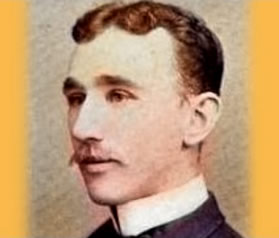
Madison Cawein (23 maart 1865 – 8 december 1914)
De Samische dichter, schilder, musicus en fotograaf Nils-Aslak Valkeapää werd geboren op 23 maart 1943 in Palonjoensuu nabij Enontekiö. Zie alle tags voor Nils-Aslak Valkeapää op dit blog.
My home is in my heart (Fragment)
Our ancestors kept fires on Allaorda
on Stuorajeaggis's tufts
in Viiddesčearru
Grandfather drowned in the fjord while fishing
Grandmother cut her shoe grass in Šelgesrohtu
Father was born in Finjubákti in burning cold
And still they ask
where is your home
They come to me
and show books
Law books
that they have written themselves
This is the law and it applies to you too
See here
But I do not see brother
I do not see sister
I cannot
I say nothing
I only show them the tundra
I see our fjelds the places we live
and hear my heart beat
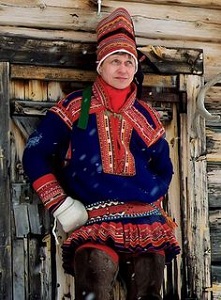
Nils-Aslak Valkeapää (23 maart 1943 – 26 november 2001)
De Zwitserse schrijfster Federica de Cesco werd geboren op 23 maart 1938 in Pordenone, Zie alle tags voor Federica de Cesco op dit blog.
Uit: Das Mondpferd
„In der Nacht war Schnee gefallen, war das drahtige Steppengras bis an den Fuß der Berge weiß überpudert. Der gefrorene Boden klirrte unter den Pferdehufen. Eine fahle Wintersonne schien über der weiten Ebene und den Felsklippen, ehe sie sich frühzeitig wieder im rötlichen Dunst zum Horizont hinabsenkte. Die Schafe und Pferde mussten für die Nacht auf den von Palisaden umzäunten Platz zusammengetrieben werden. Gleich nach dem ersten Schneefall pflegten Wölfe und Bären ihre Schlupfwinkel im Gebirge zu verlassen und in die Weidegründe einzufallen. Schon brach die Nacht herein, da entdeckte Huong, der Schäferhund, Spuren von Schafen, die sich von der Herde entfernt hatten. Mit langen, geschmeidigen Sätzen sprang er einen Berghang hinauf. Anga zögerte. Sollte sie ihm folgen? Huong müsste eigentlich allein damit fertig werden, er war gut abgerichtet und hatte Mut. Wenn sich aber unter den versprengten Schafen auch Lämmer be-fanden? Jedes Tier war wertvoll, kein einziges durfte ver-loren gehen. Schnell entschlossen setzte Anga ihr Pferd in Galopp. Weiß glänzend wie eine Silbermünze, stieg der Voll-mond langsam über die Berggipfel empor. Es war sehr kalt. Ein beißender Wind blies pfeifend von der sibiri-schen Steppe her und rüttelte an Tannen und Pappelbäu-men. Anga trug ihre Winterkleider: lederne Hosen und eine lange, pelzgefütterte Jacke, kleine, reich mit Fransen ver-zierte Stiefel mit gebogener Schnabelspitze. Wie die meis-ten Mongolenmädchen war sie groß und sehr schlank. Zwei lange, straff geflochtene Zöpfe hingen ihr bis zum Gürtel und umrahmten das bronzene, junge Gesicht. Wie weißer Nebel stand der Atem des Pferdes vor sei-nen Nüstern. Die Hufe wirbelten den trockenen Schnee auf. Huong, der Hund, glitt leise wie ein Schatten zwi-schen die Felsen. Plötzlich bellte er kurz auf und sprang schneller voran. Anga spornte das Pferd an. Hinter einer Felswand erschienen, ängstlich unter einer überhängen-den Platte zusammengeschart, einige Schafe. Knurrend umrundete Huong die Tiere. Im Halbdunkel zeigten seine Augen einen rötlichen Glanz. Die kräftigen Zähne, der lange buschige Schweif verrieten seine wölfische Her-kunft, aber nie hätte Huong die seiner Hut anvertrauten Schafe gerissen.“
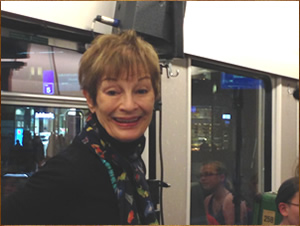
Federica de Cesco (Pordenone, 23 maart 1938)
Zie voor nog meer schrijvers van de 23e maart ook mijn blog van 23 maart 2015 deel 1 en eveneens mijn blog van 23 maart 2014 deel 1 en ook deel 2.
23-03-2017 om 17:54
geschreven door Romenu 
Tags:Cri Stellweg, Yō,ko Tawada, Gary Whitehead, Mitch Cullin, Steven Saylor, Roger Martin du Gard, Madison Cawein, Nils-Aslak Valkeapää, Federica de Cesco, Romenu
|

